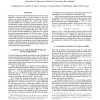Free Online Productivity Tools
i2Speak
i2Symbol
i2OCR
iTex2Img
iWeb2Print
iWeb2Shot
i2Type
iPdf2Split
iPdf2Merge
i2Bopomofo
i2Arabic
i2Style
i2Image
i2PDF
iLatex2Rtf
Sci2ools
137
click to vote
ICIP
2005
IEEE
2005
IEEE
Expression-invariant face recognition via spherical embedding
Recently, it was proven empirically that facial expressions can be modelled as isometries, that is, geodesic distances on the facial surface were shown to be significantly less sensitive to facial expressions compared to Euclidean ones. Based on this assumption, the 3DFACE face recognition system was built. The system efficiently computes expression invariant signatures based on isometry-invariant representation of the facial surface. One of the crucial steps in the recognition system was embedding of the face geometric structure into a Euclidean (flat) space. Here, we propose to replace the flat embedding by a spherical one to construct isometric invariant representations of the facial image. We refer to these new invariants as spherical canonical images. Compared to its Euclidean counterpart, spherical embedding leads to notably smaller metric distortion. We demonstrate experimentally that representations with lower embedding error lead to better recognition. In order to efficiently...
Related Content
| Added | 23 Oct 2009 |
| Updated | 14 Nov 2009 |
| Type | Conference |
| Year | 2005 |
| Where | ICIP |
| Authors | Alexander M. Bronstein, Michael M. Bronstein, Ron Kimmel |
Comments (0)

